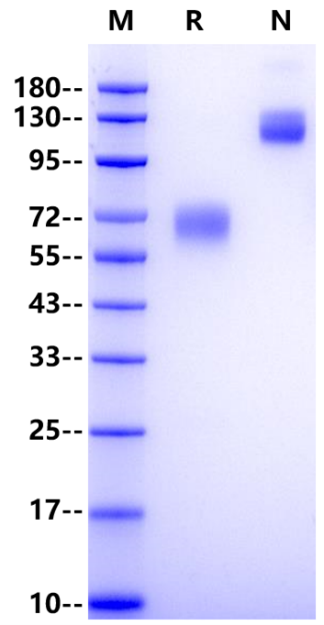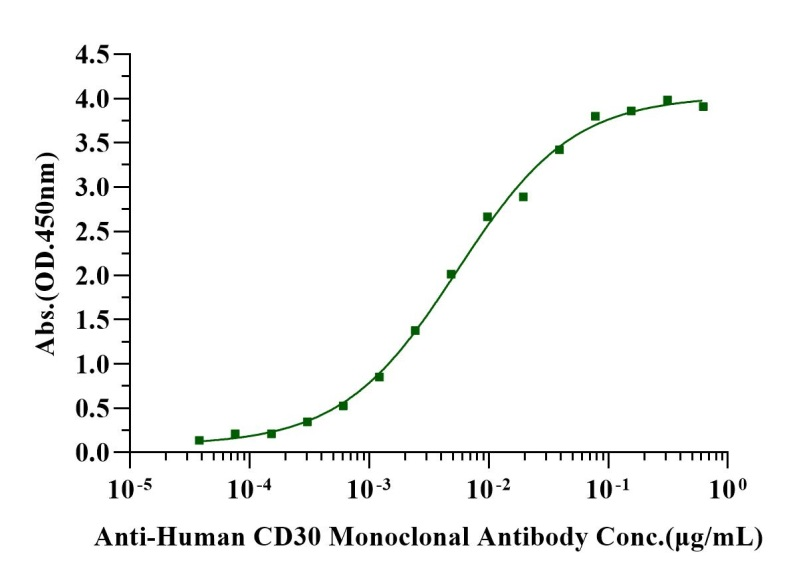Gln63-Asp234, with C-terminal mouse IgG2a Fc QRTDSIPNSPDNVPLKGGNCSEDLLCILKRAPFKKSWAYLQVAKHLNKTKLSWNKDGILHGVRYQDGNLVIQFPGLYFIICQLQFLVQCPNNSVDLKLELLINKHIKKQALVTVCESGMQTKHVYQNLSQFLLDYLQVNTTISVNVDTFQYIDTSTFPLENVLSIFLYSNSD GGGSGGGSEPRGPTIKPCPPCKCPAPNLLGGPSVFIFPPKIKDVLMISLSPIVTCVVVDVSEDDPDVQISWFVNNVEVHTAQTQTHREDYNSTLRVVSALPIQHQDWMSGKEFKCKVNNKDLPAPIERTISKPKGSVRAPQVYVLPPPEEEMTKKQVTLTCMVTDFMPEDIYVEWTNNGKTELNYKNTEPVLDSDGSYFMYSKLRVEKKNWVERNSYSCSVVHEGLHNHHTTKSFSRTPGK
60-75kDa
Reconstitute at 0.1-1 mg/ml according to the size in ultrapure water after rapid centrifugation.
1、Hargreaves P G. et al. (2002) Soluble CD30 binds to CD153 with high affinity and blocks transmembrane signaling by CD30. Eur J Immunol. 32(1): 163-173.
2、Blazar B R. et al. (2004) CD30/CD30 ligand (CD153) interaction regulates CD4+ T cell-mediated graft-versus-host disease. J Immunol. 173(5): 2933-41.
3、Oflazoglu E. et al. (2009) Targeting CD30/CD30L in oncology and autoimmune and inflammatory diseases. Adv Exp Med Biol. 647: 174-185.
CD30 ligand (CD30L, CD153), one of the TNF superfamily members, is a 40-kDa type II membrane-associated glycoprotein and is expressed on effector CD4+ T cells. The receptor for CD30L is CD30, a member of the TNF receptor (TNFR) superfamily, and is preferentially expressed on effector or memory Th cells. The bind of CD30L and CD30 induces the production of cytokine, which promotes cell proliferation, differentiation, cell growth, stagnation, and death. CD30-mediated engagement of CD30L induced cytokine secretion from immature DCs via the mitogen-activated protein kinase pathway. A number of lines of evidence suggest that a CD30L/CD30-mediated signal is involved in the development of diseases associated with both Th1 and Th2 cell responses, such as diabetes in young non-obese diabetic mice, mycobacterial infection, and allergic inflammation. Other reported that CD30L/CD30 signaling is critically involved in antigen-specific CD4 T cell responses at both the induction and effector phase, thus could be a new target molecule for the treatment of central nervous system autoimmunity.


Immobilized CD30/TNFRSF8 His Tag Protein, Human (Cat. No. UA010362) at 2μg/mL (100μL/well) can bind CD30 Ligand mFc Chimera Protein, Human (Cat. No. UA010378) with EC50 of 0.29-0.34μg/ml.